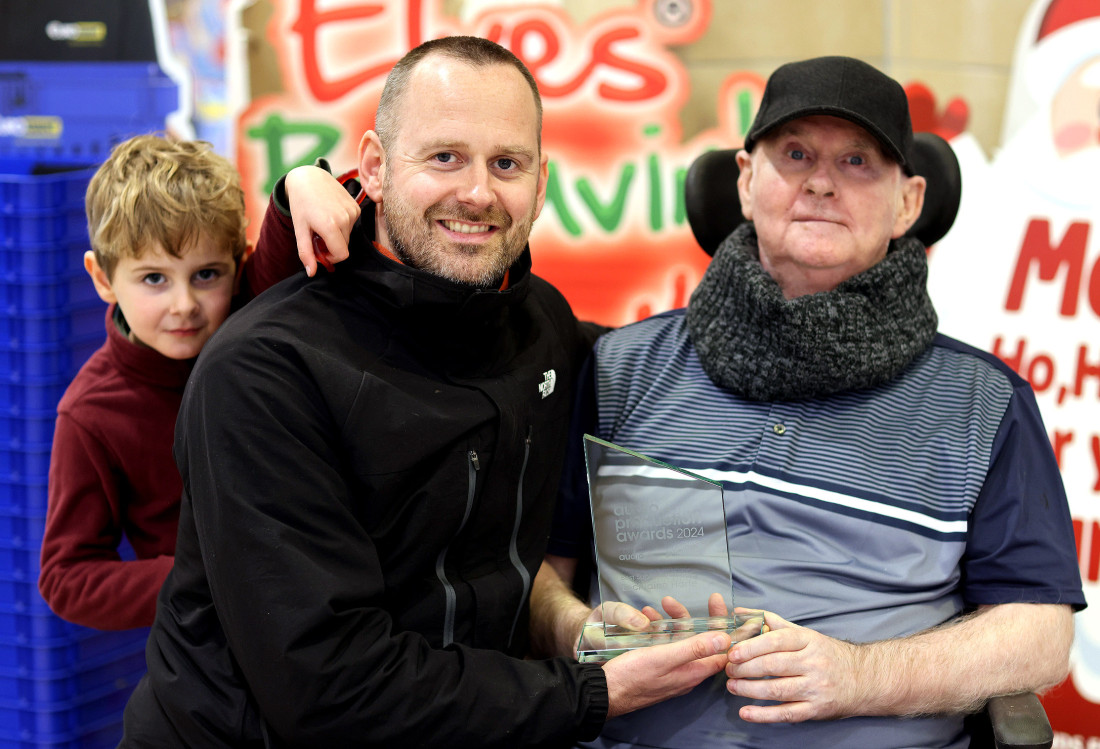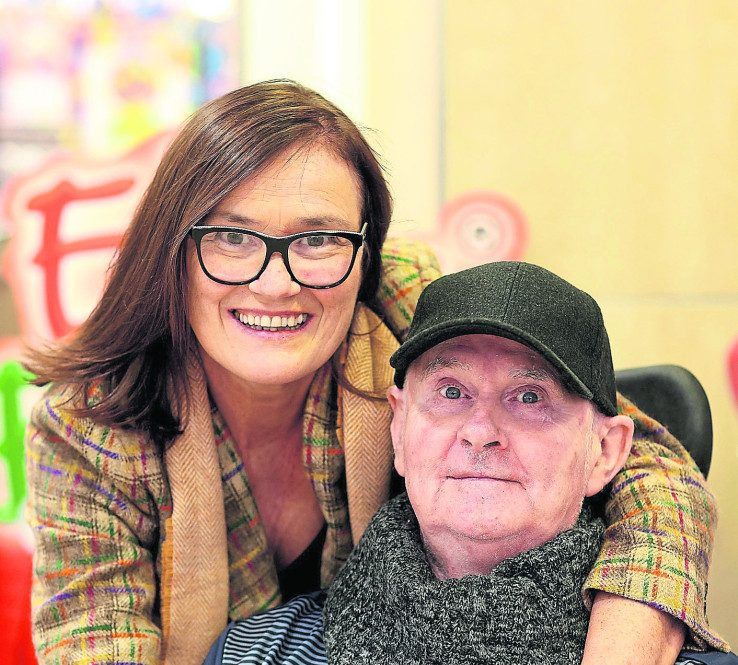By Louise Doyle
WHEN Mary Harte casts her eyes to the incoming government after tomorrow’s general election, foremost in her mind is her continued fight for a pathway of care for her husband, Jimmy.
The Raphoe man, a former Labour Party and Fine Gael politician and member of Seanad Éireann, was found collapsed on a Dublin street with a traumatic brain injury after a Republic of Ireland soccer match in November 2013.
The father-of-four underwent emergency surgery and spent time on a life-support machine.
It was the beginning of a long journey for Mr Harte, his wife and family who found themselves coming to terms with a devastating diagnosis and grappling with a situation very much out of their control.
Speaking to the Donegal News, Mrs Harte recalled the trauma visited upon the family.
“Jimmy, for the most part, was a very sociable person, he just loved people. His mother and father were the same. He loved talking to people, that is one thing he never lost,” she said.
“We don’t know what happened other than he was found unresponsive in 2013 with a traumatic brain injury. He was rushed to St James’s Hospital and Beaumont for surgery. We went to numerous hospitals, and we went to medical rehabilitation in Letterkenny.
“Jimmy came home and I cared for him for five years with help from HSE carers. It was a whole different ball game. The entire family was traumatised, unbeknown to themselves at the time. Everyone had weak moments at different times. We all picked each other up as best we could. It was very tough going, not to be underestimated.”
Mrs Harte said her husband deteriorated at home, just shortly before the onset of the Covid-19 pandemic.
Following a family meeting with the HSE and other practitioners, it was decided that Mr Harte be placed in a nursing home in the interim.
But the arrival of the pandemic not only left Mr Harte’s family outside the nursing home looking in, but also saw a decline in his mobility as physiotherapy services were not available.
“I found myself looking in the window of the nursing home waving at my husband. It was an extremely difficult time. Jimmy walked into the nursing home using a walking frame and he came out in a wheelchair because there was no physiotherapy service. Jimmy paid a high price, despite the greatest efforts of staff who put themselves on the frontline every day during Covid. I will be eternally grateful to them.
“But Jimmy was too young to be in a nursing home, that’s the reality of it. There is no definitive kind of care pathway for those with an acquired brain injury once they come out of hospital.”
While Mrs Harte has welcomed funding of €4 million being allocated to the national trauma strategy, she said what is lacking is a community neurological service.
“A nursing home is not the right place for a young person. Jimmy was only 62 at the time. There are 1,300 young people in Ireland between 20 and 65 inappropriately placed in nursing homes. It’s the scandal of the century. In Donegal, there are young men who have been in car accidents who have been inappropriately placed in nursing homes because there is nowhere else for them to go.”
Mrs Harte, who worked in rehabilitation, gave up her job to look after her husband.
“I didn’t know what I was coming home to each day. Jimmy needed so much help and supports such as social, occupational and physiotherapy. I put myself on hold because I was so concentrated on getting Jimmy from A to B. It’s not the way you imagine your life panning out when you’re in your 60s.”

Lochlainn Harte with his father Jimmy and Lochlainn’s son Oscar. Lochlainn was awarded Best Sports Producer Award earlier this week, for his work on his solo podcast, ‘Corny: The Last Irishman in the NFL.
Mrs Harte said a very rarely discussed element is the financial impact of an acquired brain injury on families.
“Myself and Jimmy were the lucky ones in that we were cash poor but asset rich. When we were very young and married in the beginning we bought a property against my better judgment at my time.
“I was able to get the Fair Deal Scheme, which isn’t very fair at all. It costs €4,000 a month if you’re going into care in this country. Where do people get that money? For the three years Jimmy has been in a nursing home I owe €90,000.
“You have to sell your property to pay your bill. People don’t usually go into a nursing home until around the age of 85. Life expectancy in nursing homes is on average five years. Jimmy could live for 25 more years, so when I hear parties saying to punish people who own a property I think to myself, ‘what about people in my position?’
“I had to sell the businesses to cover costs. There wasn’t anything left in the kitty.”
Mrs Harte said she will continue to give a voice to seeing a definitive pathway of care for her husband.
“That is where funding has to go. I can be assured people will be looked after in a trauma unit but when it’s time to go home, the continued care is not there. When candidates knocked on my door during this election campaign that is what I have been telling them.
“This happened in November 2013, and we’re here in November 2024 and I am still asking where is the pathway of care of physiotherapy, social and so on?
“Jimmy attends the Irish Wheelchair Association and they are very good. But there is still a lack of joined up thinking on a broader level.”
Mrs Harte recalled a particularly difficult time for her husband, when she could only reach him, aptly, through his love of people and politics:
“One time after an operation in Letterkenny Hospital Jimmy was so ill. I remember going in, the curtains were closed and it was dark. He wouldn’t get out of bed. I got a table and two chairs and put it at the end of the corridor. I told him that a political clinic was taking place and there were people coming to see him. He got out of the bed, with great difficulty, and as luck had it, his brother, Johnny, came to visit at that exact moment.
“You have to reach the thing of interest, and people run deep with Jimmy.
“I’m ready to fight again because although he is doing well today, doesn’t mean he will be doing well next month. Services have to reflect that.”
Mr Harte told the Donegal News: “The hospital cured me but I healed at home with love and care.”
Meanwhile Acquired Brain Injury Ireland is calling for an end to underinvestment in community services.
“For too many people in Ireland, surviving a brain injury isn’t where the fight ends – it’s where it begins. Ahead of the election on Friday, November 29 we are calling on candidates to uphold the human rights of brain injury survivors and give them the chance to live the lives they fought so hard for.
“Anyone who has survived that trauma should be able to get the support they need to rebuild their lives, no matter where they live”, said Acquired Brain Injury Ireland Chief Executive, Karen Foley.
“But years of underinvestment in community rehabilitation services and a failure to fully implement national policy have left thousands of survivors and families feeling lost and abandoned on their rehabilitation journey. The result is that survivors are often discharged from acute hospital to home, without the necessary supports, information or signposting to the services they need. Worse, they could be placed inappropriately in a nursing home for older people because there is simply no other option.
“With the right support at the right time, survivors of brain injury can regain much of their independence. We see the tangible, positive impacts of rehabilitation in our services every day. It is critical, for those impacted and their families, that community neuro rehabilitation services are funded for the long-term.”










